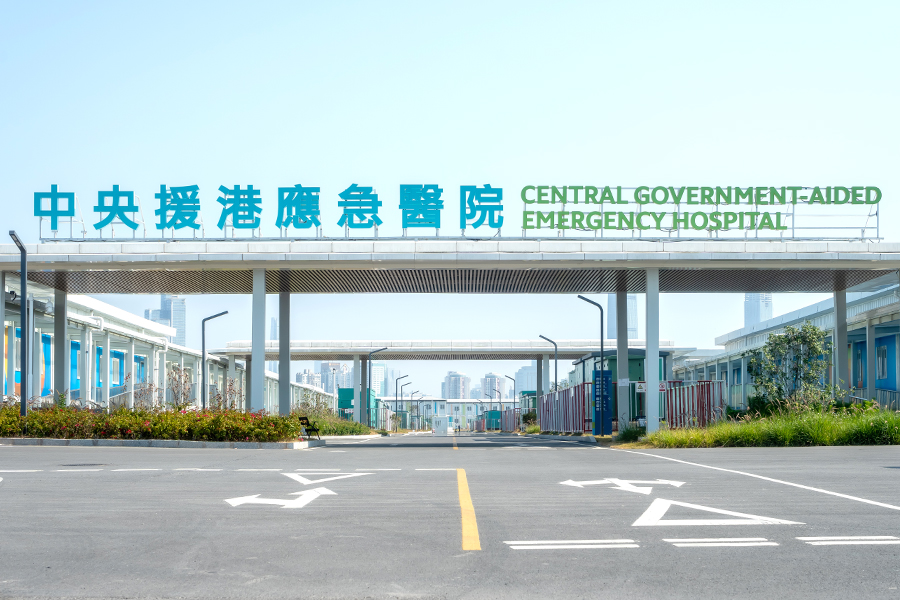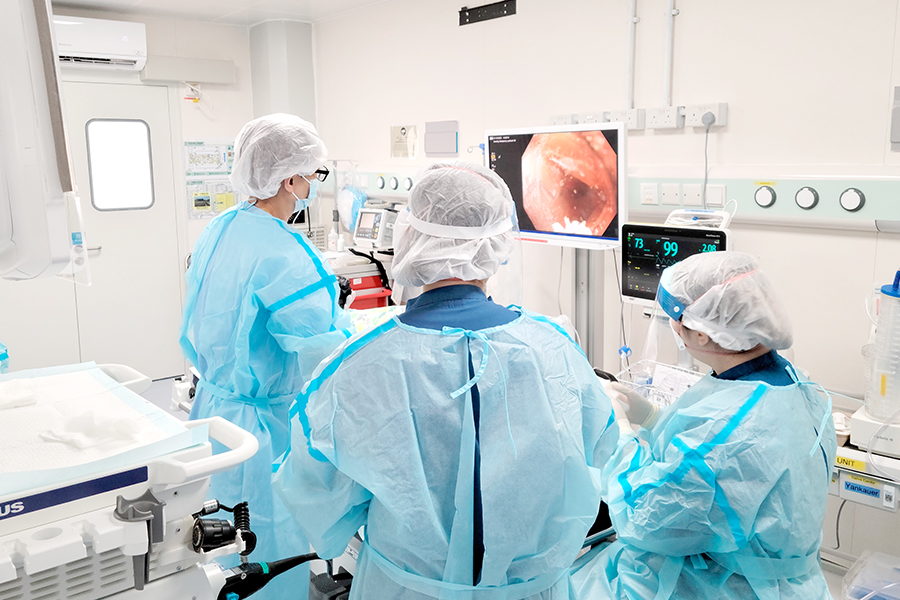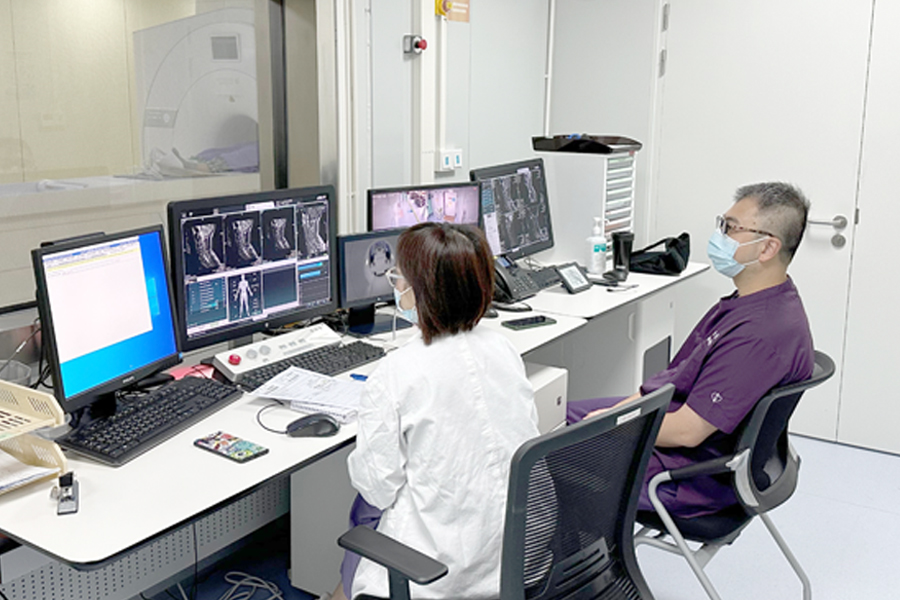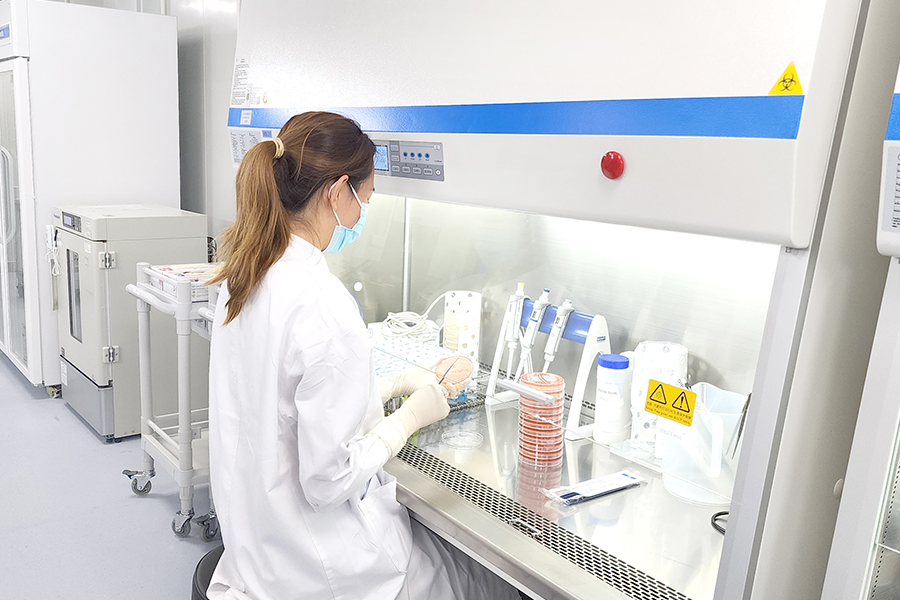
The Ambulatory Diagnostic Radiology Service Pilot Programme was launched in April to allow patients with suitable conditions to receive radiological diagnostic services at the Central Government-Aided Emergency Hospital (CGAEH). More than 4,400 patients have joined the programme so far, and the CGAEH further expanded its services in October. It increased the service capacity for Computed Tomography (CT) scan and launched contrast CT scan and ultrasound scan services. In addition, it now offers one more option to patients under an endoscopy service pilot scheme and has set up a microbiology laboratory for multi-drug resistant organism (MDRO) screening as well as provides sleep test. Hospital Authority hopes the expansion will shorten waiting times for patients and ease pressure on public hospitals.
Endoscopy service

CGAEH has launched a pilot scheme on endoscopy service for patients suffering from stomachache and acid reflux. Non-urgent outpatients aged 18 to 70 who are referred from family medicine clinics or who have waited for more than six months at specialist outpatient clinics are eligible and can join on a voluntary basis. The scheme is expected to shorten waiting times to three months.
Radiological diagnostic service

CGAEH has gradually increased its daily service capacity and is expected to complete 6,000 CT scans and 2,000 Magnetic Resonance Imaging (MRI) scans by the end of this year. Ultrasound scans and the contrast CT scan service will be available to all public hospital patients from December. The waiting times for CT scans and MRI scans for patients who joined the Ambulatory Diagnostic Radiology Service Pilot Programme were respectively reduced from 123 weeks to 38 weeks and from 122 weeks to 50 weeks at the end of September.
Microbiology service

MDRO screening services include identification, antimicrobial susceptibility test and gene detection of vancomycin-resistant enterococci and multi-drug resistant Acinetobacter. The services will be gradually expanded from New Territories East Cluster to New Territories West and Hong Kong East Clusters and are expected to handle up to 70,000 samples a year.
Sleep test
10 single rooms with adjoining restrooms have provided 40 sleep tests a week for public hospital patients since October.
 The Ambulatory Diagnostic Radiology Service Pilot Programme was launched in April to allow patients with suitable conditions to receive radiological diagnostic services at the Central Government-Aided Emergency Hospital (CGAEH). More than 4,400 patients have joined the programme so far, and the CGAEH further expanded its services in October. It increased the service capacity for Computed Tomography (CT) scan and launched contrast CT scan and ultrasound scan services. In addition, it now offers one more option to patients under an endoscopy service pilot scheme and has set up a microbiology laboratory for multi-drug resistant organism (MDRO) screening as well as provides sleep test. Hospital Authority hopes the expansion will shorten waiting times for patients and ease pressure on public hospitals.
The Ambulatory Diagnostic Radiology Service Pilot Programme was launched in April to allow patients with suitable conditions to receive radiological diagnostic services at the Central Government-Aided Emergency Hospital (CGAEH). More than 4,400 patients have joined the programme so far, and the CGAEH further expanded its services in October. It increased the service capacity for Computed Tomography (CT) scan and launched contrast CT scan and ultrasound scan services. In addition, it now offers one more option to patients under an endoscopy service pilot scheme and has set up a microbiology laboratory for multi-drug resistant organism (MDRO) screening as well as provides sleep test. Hospital Authority hopes the expansion will shorten waiting times for patients and ease pressure on public hospitals.
 CGAEH has launched a pilot scheme on endoscopy service for patients suffering from stomachache and acid reflux. Non-urgent outpatients aged 18 to 70 who are referred from family medicine clinics or who have waited for more than six months at specialist outpatient clinics are eligible and can join on a voluntary basis. The scheme is expected to shorten waiting times to three months.
CGAEH has launched a pilot scheme on endoscopy service for patients suffering from stomachache and acid reflux. Non-urgent outpatients aged 18 to 70 who are referred from family medicine clinics or who have waited for more than six months at specialist outpatient clinics are eligible and can join on a voluntary basis. The scheme is expected to shorten waiting times to three months.
 CGAEH has gradually increased its daily service capacity and is expected to complete 6,000 CT scans and 2,000 Magnetic Resonance Imaging (MRI) scans by the end of this year. Ultrasound scans and the contrast CT scan service will be available to all public hospital patients from December. The waiting times for CT scans and MRI scans for patients who joined the Ambulatory Diagnostic Radiology Service Pilot Programme were respectively reduced from 123 weeks to 38 weeks and from 122 weeks to 50 weeks at the end of September.
CGAEH has gradually increased its daily service capacity and is expected to complete 6,000 CT scans and 2,000 Magnetic Resonance Imaging (MRI) scans by the end of this year. Ultrasound scans and the contrast CT scan service will be available to all public hospital patients from December. The waiting times for CT scans and MRI scans for patients who joined the Ambulatory Diagnostic Radiology Service Pilot Programme were respectively reduced from 123 weeks to 38 weeks and from 122 weeks to 50 weeks at the end of September.
 MDRO screening services include identification, antimicrobial susceptibility test and gene detection of vancomycin-resistant enterococci and multi-drug resistant Acinetobacter. The services will be gradually expanded from New Territories East Cluster to New Territories West and Hong Kong East Clusters and are expected to handle up to 70,000 samples a year.
MDRO screening services include identification, antimicrobial susceptibility test and gene detection of vancomycin-resistant enterococci and multi-drug resistant Acinetobacter. The services will be gradually expanded from New Territories East Cluster to New Territories West and Hong Kong East Clusters and are expected to handle up to 70,000 samples a year.